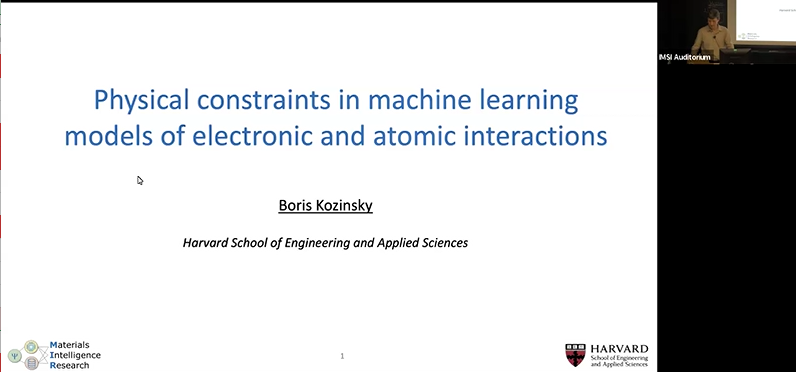Physical constraints in machine learning models of electronic and atomic interactions
Presenter
March 26, 2024
Event: 41725
Abstract
Discovery and understanding of next-generation materials requires a challenging combination of the high accuracy of first-principles calculations with the ability to reach large size and time scales. We pursue a multi-tier method development strategy in which machine learning (ML) algorithms are combined with exact physical symmetries and constraints to significantly accelerate computations of electronic structure and atomistic dynamics. First, density functional theory (DFT) is the cornerstone of modern computational materials science, but its current approximations fall short of the required accuracy and efficiency for predictive calculations of defect properties, band gaps, stability and electrochemical potentials of materials for energy storage and conversion. To advance the capability of DFT we introduce non-local charge density descriptors that satisfy exact scaling constraints and learn exchange functionals called CIDER [1]. These models are orders of magnitude faster in self-consistent calculations for solids than hybrid functionals but similar in accuracy. On a different level, we accelerate molecular dynamics (MD) simulations by using machine learning to capture the potential energy surfaces obtained from quantum calculations. We developed NequIP [2] and Allegro [3], the first deep equivariant neural network interatomic potential models, whose Euclidean symmetry-preserving layer architecture achieves state-of-the-art data efficiency and accuracy for simulating dynamics of molecules and materials. The machine learning architectures can also be combined with physical constraints to learn electronic polarization and Born effective charges which can be used to predict dielectric and spectroscopic properties of materials.
[1] K. Bystrom, B. Kozinsky, arXiv:2303.00682 (2023)
[2] S. Batzner et al, Nature Comm. 13 (1), 2453 (2022)
[3] A. Musaelian, S. Batzner et al, Nature Comm. 14, 579 (2023)
